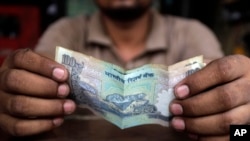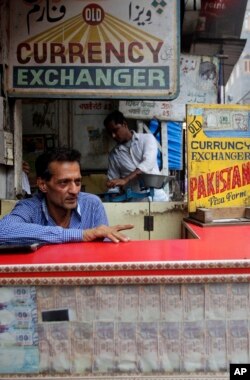NEW DELHI —
As the Indian currency slides to an all-time low against the dollar, the Indian Finance Minister is trying to bolster confidence in the country’s flagging economy.
The rupee’s slide this week came on the heels of steady losses over the last month. Overall the Indian currency has slipped by 8 percent since the start of May.
India’s Finance Minister P. Chidambaram Thursday tried to calm fears that the falling currency will put further strain on the flagging economy. He said India’s huge trade imbalance has triggered the slide. The current account deficit as it is called, is driven by the country's massive oil and gold imports.
Chidambaram pledged to stabilize the rupee.
“Countries with large current account deficits have taken a hit on the currency. These include South Africa, Mexico, Brazil, Chile, Turkey," he said. "Since India has a large current account deficit, the rupee is taking a hit. But I don’t think there is any reason for panic. Yes, it does put pressure on inflation, it does put pressure on the subsidy bill, especially for imported commodities, but I think the rupee will find its level.”
However, the rupee continued its slide on Thursday.
Economists pointed out that the Indian currency has been battered more than those in any other emerging market in recent days.
Chidambaram also urgd Indians to curb their voracious appetite for gold. Although gold imports have declined in recent weeks, they are still a massive strain on government finances. The country is the world’s largest consumer of the yellow metal, but high prices and a falling rupee in the past year have meant that India is shelling out billions of dollars for gold purchases.
“People who want to buy gold must realize that every ounce of gold is imported. Every ounce," said Chidambaram. "No gold is manufactured in India. You pay rupees, we have to provide the dollars. I would once again appeal to everyone, please resist the temptation to buy gold.”
Despite the problems, Chidambaram is confident that India’s economy is on the path to recovery, saying that inflation has cooled, and India is taking steps to control its large fiscal deficit.
One piece of good news has come in for Asia’s third largest economy. On Wednesday, Fitch Ratings revised India's rating outlook to "stable" from "negative" on the back of measures taken by the government to contain the budget deficit.
That has come as a boost for a government which has been fighting to avoid a ratings downgrade in the last year.
The finance minister promised more reforms in the coming weeks to boost investment and revive flagging growth. India’s economy grew at a decade low of five percent last year.
The rupee’s slide this week came on the heels of steady losses over the last month. Overall the Indian currency has slipped by 8 percent since the start of May.
India’s Finance Minister P. Chidambaram Thursday tried to calm fears that the falling currency will put further strain on the flagging economy. He said India’s huge trade imbalance has triggered the slide. The current account deficit as it is called, is driven by the country's massive oil and gold imports.
Chidambaram pledged to stabilize the rupee.
“Countries with large current account deficits have taken a hit on the currency. These include South Africa, Mexico, Brazil, Chile, Turkey," he said. "Since India has a large current account deficit, the rupee is taking a hit. But I don’t think there is any reason for panic. Yes, it does put pressure on inflation, it does put pressure on the subsidy bill, especially for imported commodities, but I think the rupee will find its level.”
However, the rupee continued its slide on Thursday.
Economists pointed out that the Indian currency has been battered more than those in any other emerging market in recent days.
Chidambaram also urgd Indians to curb their voracious appetite for gold. Although gold imports have declined in recent weeks, they are still a massive strain on government finances. The country is the world’s largest consumer of the yellow metal, but high prices and a falling rupee in the past year have meant that India is shelling out billions of dollars for gold purchases.
“People who want to buy gold must realize that every ounce of gold is imported. Every ounce," said Chidambaram. "No gold is manufactured in India. You pay rupees, we have to provide the dollars. I would once again appeal to everyone, please resist the temptation to buy gold.”
Despite the problems, Chidambaram is confident that India’s economy is on the path to recovery, saying that inflation has cooled, and India is taking steps to control its large fiscal deficit.
One piece of good news has come in for Asia’s third largest economy. On Wednesday, Fitch Ratings revised India's rating outlook to "stable" from "negative" on the back of measures taken by the government to contain the budget deficit.
That has come as a boost for a government which has been fighting to avoid a ratings downgrade in the last year.
The finance minister promised more reforms in the coming weeks to boost investment and revive flagging growth. India’s economy grew at a decade low of five percent last year.





